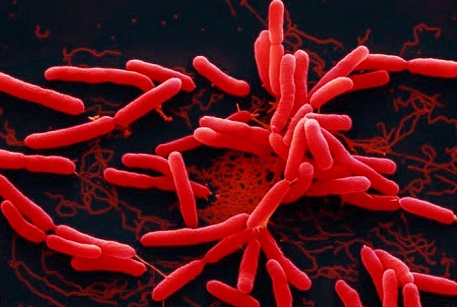Thailand medical authorities issue urgent warning on Melioidosis amid rising cases
Nikhil Prasad Fact checked by:Thailand Medical News Team Aug 12, 2024 1 year, 4 months, 1 week, 6 days, 7 hours, 39 minutes ago
Thailand Medical: In light of the recent surge in melioidosis cases across Thailand, the Disease Control Office 6 in Chonburi has issued a stern warning to citizens, particularly those working in agriculture and flood-prone areas. This bacterial infection, also known as "soil fever," has become increasingly prevalent, prompting health officials to advise strict precautions to prevent its spread.
 Thailand medical authorities issue urgent warning on Melioidosis amid rising cases
Understanding Melioidosis: A Deadly Bacterial Threat
Thailand medical authorities issue urgent warning on Melioidosis amid rising cases
Understanding Melioidosis: A Deadly Bacterial Threat
Melioidosis, caused by the bacterium Burkholderia pseudomallei, is a potentially fatal infection that thrives in soil and water. It is particularly common in tropical climates like Southeast Asia and Northern Australia. In Thailand, it poses a significant threat to farmers and individuals who work directly with soil and water, especially in rice fields, orchards, vegetable plots, rubber plantations, and ponds.
The bacteria enter the body through three primary routes: direct contact with contaminated soil or water, ingestion of contaminated food or water, and inhalation of dust particles from contaminated soil. Once inside the body, the infection can manifest within 1 to 21 days, though in some cases, symptoms may not appear for a year. The severity of the disease depends on the bacterial load and the individual's immune system.
Rising Melioidosis Cases in Thailand: A Cause for Concern
From January 1 to July 31, 2024, Thailand recorded 2,041 cases of melioidosis, resulting in 60 deaths. According to
Thailand Medical authorities, the majority of these cases were reported in the Northeast region, highlighting the severity of the situation. In Health Region 6 alone, there were 168 cases and four deaths within the same period. The most vulnerable demographic appears to be middle-aged Thai men, particularly those engaged in agriculture or those with underlying health conditions such as diabetes, alcoholism, and other chronic illnesses.
Symptoms and Diagnosis: Why Melioidosis Is Often Misdiagnosed
One of the most challenging aspects of melioidosis is its wide range of symptoms, which often mimic other diseases, making it difficult to diagnose. The infection can be localized, presenting as skin abscesses or ulcers, or it can spread throughout the body, affecting multiple organs. Common symptoms include high fever, headache, muscle aches, respiratory issues, and in severe cases, sepsis.
Melioidosis frequently presents as a lung infection, with symptoms such as cough, chest pain, and loss of appetite. However, the disease can also affect the liver, spleen, prostate, joints, bones, lymph nodes, skin, and brain. Given the disease's diverse manifestations, it is often mistaken for other infections, leading to delays in treatment.
High-Risk Groups and Environmental Exposure
While anyone can contract melioidosis, certain groups are at higher risk, particularly those with weakened immune systems due to
conditions like diabetes, heavy alcohol use, liver and kidney diseases, thalassemia, cancer, or chronic lung diseases. Additionally, individuals who frequently come into contact with contaminated soil or water, such as farmers and construction workers, are more susceptible.
The risk of exposure increases significantly after severe weather events such as hurricanes or heavy rainfall, which can cause the bacteria to rise to the soil's surface. This environmental factor is particularly concerning in Thailand, where such weather conditions are common.
Preventative Measures: How to Protect Yourself
In response to the growing threat of melioidosis, Thai health authorities are urging citizens to take several preventative measures. These include avoiding direct contact with soil and water, particularly if you have open wounds or chronic health conditions. Wearing protective gear, such as boots, is strongly recommended for those who work in agriculture or other high-risk professions.
Additionally, drinking only clean or boiled water is crucial to avoid ingesting the bacteria. If you develop symptoms like a sudden high fever, headache, or muscle aches, it is essential to seek medical attention immediately and inform your doctor about any recent exposure to soil or water.
Treatment and Recovery: What to Expect
Treatment for melioidosis typically involves a lengthy course of antibiotics. Initially, intravenous antibiotics are administered for two to eight weeks, followed by oral antibiotics for an additional three to six months. Completing the full course of treatment is vital to ensure the infection is eradicated and to prevent recurrence.
However, even with treatment, melioidosis can be fatal, particularly if diagnosis and treatment are delayed. This underscores the importance of early detection and prompt medical intervention.
CDC and Global Health Efforts: Preparing for the Worst
The Centers for Disease Control and Prevention (CDC) in the United States, along with other global health organizations, are closely monitoring melioidosis due to its potential use as a biological weapon. The bacteria that cause melioidosis are highly resilient and can survive in a variety of environmental conditions, making them a potential threat in bioterrorism scenarios.
https://www.cdc.gov/melioidosis/about/index.html
While the likelihood of such an attack is uncertain, the CDC and other agencies are preparing for all possible outcomes to protect public health.
Conclusion: Vigilance and Awareness Are Key
As melioidosis continues to pose a significant health risk in Thailand, particularly in agricultural and flood-prone areas, it is crucial for citizens to remain vigilant and adhere to the recommended precautions. Awareness and early intervention are essential in reducing the impact of this deadly infection.
For the latest updates on melioidosis and other health concerns, be sure to follow developments and stay informed through trusted sources like
Thailand Medical News. We are not funded by any pharma giants or any filthy and corrupted governments or entities with their own agendas unlike most of the medical news sites or mainstream media in the West!
Read Also:
https://www.thailandmedical.news/news/thailand-medical-authorities-warn-of-rising-cases-of-leptospirosis-in-southern-provinces
https://www.thailandmedical.news/news/thailand-medical-study-validates-anti-inflammatory-claims-of-yataprasen-a-thai-traditional-herbal-medicine
